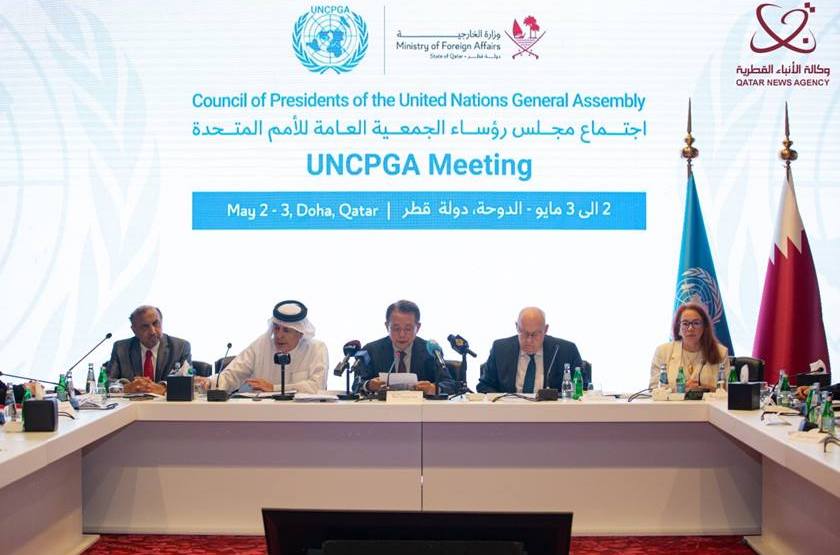The UNGA’s Doha Declaration advocates for a Gaza ceasefire and highlights global humanitarian crises, underscoring Qatar’s pivotal role in mediating regional and global disputes.
The United Nations General Assembly’s (UNGA) Doha Declaration calls for a permanent Gaza ceasefire, among other urgent global imperatives this week.
The Meeting of the Council of Presidents of the UNCPGA, hosted by Qatar, kicked off on Thursday, chaired by the Chairman of the Council of Presidents of the United Nations General Assembly Dr Han Seung-soo.
President of the 66th UNGA Nassir bin Abdulaziz Al Nasser lauded the pivotal role of Qatar in shaping this landmark declaration, in an interview with Qatar News Agency, where he further underscored the Gulf country’s commitment to fostering international peace and security.
The Doha Declaration further called for ramping up humanitarian aid efforts and kickstarting substantive actions to address the Palestinian predicament in alignment with international legitimacy resolutions, including the recognition of a Palestinian state based on the 1967 borders with East Jerusalem as its capital.
The UNGA Presidents urged the secretary-general of the UN to spearhead a comprehensive peace initiative anchored in the two-state solution, accompanied by a concrete action plan to kickstart the process, Al Nasser detailed in the interview.
The declaration, spanning over two days, delved into pressing global issues, with a spotlight on the dire humanitarian crisis unfolding in the Gaza Strip as a result of the Israeli genocide.
This comes as the United Nations Security Council failed to adopt a draft resolution accepting Palestine’s full UN membership after the United States used its veto power.
Qatar had issued a statement on April 19 where it expressed “its deep regret at the failure” to adopt the resolution.
Doha had described it as “a sad day for justice and a setback for efforts to bring peace to the region.”
Palestine is currently a “non-member observer state” whereas Israel enjoys a full membership.
Israel received its membership in 1949, a year after the beginning of the Nakba, or catastrophe, in which Israel forcibly displaced and killed Palestinians to establish a Jewish state.
Al Nasser emphasised Qatar’s belief in the UN’s significant role in tackling multifaceted global challenges.
He reiterated Doha’s staunch commitment to promoting international peace, security, and mutual understanding across diverse spheres.
Addressing the broader global landscape, Al Nasser highlighted the declaration’s references to ongoing crises, including the deteriorating humanitarian situation in Sudan and the imperative for strong international support to bolster the UN’s response mechanisms.
Looking ahead, deliberations also revolved around the forthcoming summit slated for the commencement of the next session of the UNGA in September.
Reflecting on the evolution of global dynamics since the inception of the UN in 1945, Al Nasser advocated for a recalibration of the United Nations Charter and its institutional framework to better tackle contemporary crises, emphasising the necessity for adaptation to the evolving geopolitical landscape.
Praising Qatar’s leadership, the Doha Declaration lauded Qatar’s instrumental role in mediating various regional and global disputes.
Al Nasser addressed Qatar’s pivotal stature as one of the foremost champions of the UN’s endeavours across diverse sectors, particularly in supporting the United Nations Relief and Works Agency for Palestine Refugees in the Near East (UNRWA) and addressing refugee issues on a global scale.







